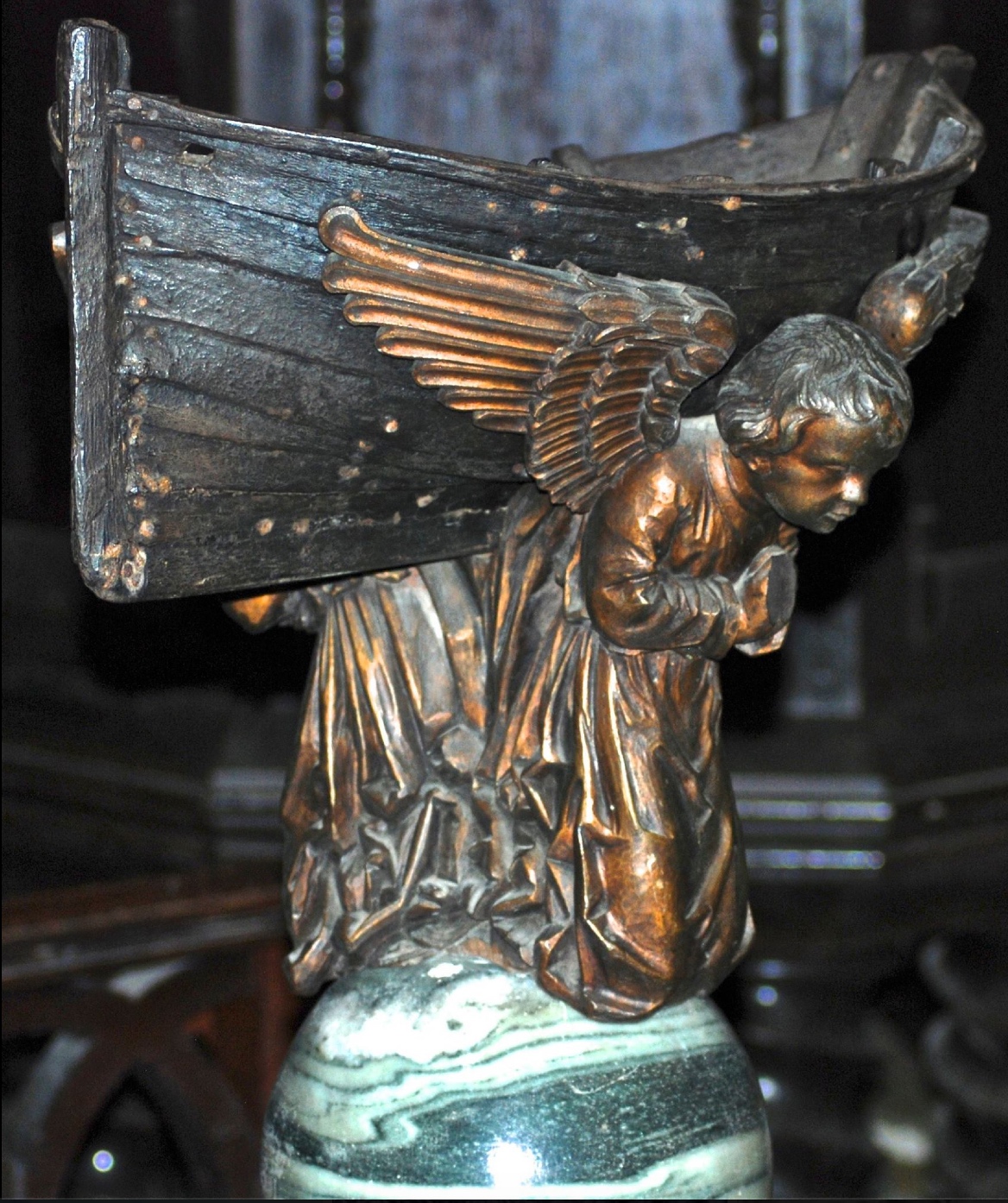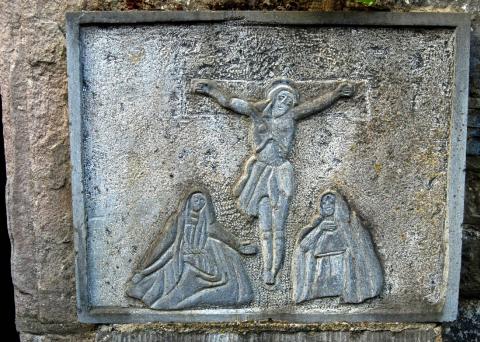Category:
We listen to God, we hear God speak, through Scripture, by prayer and by attending (listening) to our life.
You may be aware of the ‘alphabet of grace’ – Christian author Frederick Buechner’s way of describing how God speaks to us, in the everyday events of our life, in the episodes both small and great, in the ordinary and the extra-ordinary moments that all of us receive. Each event is a letter of an alphabet, as it were, that, taken and linked together, comprise words, then make sentences and finally comprise the unique story that is the life of each one of us.
But think with me also about the privilege and Christian responsibility of attending faithfully to God’s Word in Scripture. We want to come humbly also to Scripture, remembering that though we believe it to be inspired, it doesn’t follow that our interpretations always are. I would hope, or remind, or ask you this year to develop or find a plan that works for you of reading regularly the Christian Scriptures, perhaps to read it for the first time, or reading it THROUGH for the first time.
A professor of Old Testament at Bible College years ago, used to remind us that one of the primary and most helpful ways of understanding the Old Testament -- was simply to read it. Who knew?!
Maybe, this year we could purchase another, a new Version for your reading; write it our, type it out, memorize it; meditate as you do. ('Mediation' is like a cow 'ruminating;' it’s good for you.) The Bible is full of good news; it’s God’s wisdom. Our souls shrivel and die without it. We do not live alone by the food of Metro or Loblaws – or some bulk barn. ‘Your Word I’ve hid in my heart,’ wrote David the psalmist, “so I won’t sin against You.” “Your Word is a light unto my feet, a guide unto my path.” How we need that. Why would any would-be disciple think that such a joyful, practical and rich discipline of attending to God’s Word in Scripture was not something for whichwe would make space and time?
But here are some words of guidance – and maybe even of caution: - Take the text seriously but not always literally. The Bible is not one book – but many books. Inspired by God’s Spirit, yes, but utilizing the personality, approach, contexts and various genres that each author (and sometimes composite and different authors) chose to use. There’s history in the Bible: – rich historical narratives and stories - and gospel-writing styles – at least four of them. There are short stories (like the Book of Ruth) and long epic accounts. There is poetry and like today – and a great deal more so in the ancient Middle East, there’s such a thing as ‘poetic license.’
My seminary professor told us – “ancient Middle East poetry and literature was a little like this: - A psalmist writes, “I drove my car into a ditch; yea, verily, my bicycle into a tree.” Now, the Modern, literal, overly-rationale mind asks: - ‘So which was it? Was he driving a car – or a bicycle?!’ But all the psalmist is saying, cautioned my professor, in (to us) this wonderfully-weird way: “I had an accident!”
Or perhaps like this . . . The text, each verse in various places may be very much like a telescope. Examining the text is like looking through a telescope. A telescope has a right and a wrong end to look through – unless you’re a kid just fooling around. We may look through the wrong end - and all becomes small, narrow, and even insignificant. It may lead us wrongly to focus too much on the small and petty, on that which only leaves us with mere moralisms, that leaves us with the sharp, piercing letter of the law that kills, rather than the spirit of the matter, the key point and the spirit of God’s intent – with the spirit and essence of the matter that, like God’s Holy Spirit, gives life. We are as servants of a new covenant (Paul wrote to the Corinthian Church), ‘not of the letter but of the Spirit; for the letter kills, but the Spirit gives life.’
Here’s another word of caution as we look at Scripture. Things that appear clear can have quite another meaning that we may first think, even if we’ve though it for a long time. Jews in Jesus day were looking for the return of Elijah the prophet, before the great and wondrous day of Messiah’s appearing. But Jesus said in effect about his forerunner, John the Baptist – “If you can get it (if you understand my meaning), John the Baptist (who had just died) – this John was ‘Elijah’ that was to come, of whom the prophet spoke. Thus, it wasn’t a literal return of Elijah but the return of the spirit, the similarities, the essence of the man – in the person of John the Baptist. (You could look it up.) He ate like, dressed like, spent time in the desert in ministry – like Elijah.
Is God messing with us, confusing us, changing the rules of exegesis midstream? I wouldn’t want to say so, but it does mean we need to come humbly, and pay attention, and maybe expect sometimes to be surprised as new light breaks forth from the eternal Word.
Scripture also has apocalyptic literature ('Daniel' and 'Revelation'), sometimes with dream and night-mare like images . . . and changes of perspective, view and context, like our own dreams that when we awake we try to remember and mostly can’t. Apocryphal literature has much over-the-top hyperbole and many images, usually of the known past but put together in new ways, which may also have been or come now to us almost like code as we face (as did the seven churches to which John wrote in Revelation) in the dangers, realities, challenges and sure victories of our day, through Christ.
Let me explain further. When I was growing up, when my parents and others I knew were talking of someone who had succeeded in early in life at some exploit or another, and was being hailed, lauded and recognized for such, and my parents weren’t sure at all that the glory would or should last . . . would say with some measure of skepticism: ‘Well, you just wait and see: he’ll meet his Waterloo!’ What did they mean? Well, they were referring to the Battle of Waterloo in Belgium in 1815, a date marking the final defeat and soon-after banishment of France’s Emperor - Napoleon Bonaparte. ‘He’ll meet his Waterloo,’ became an expression throughout the British Empire and it lasted down till at least my early years. My parent were not referring literally to that great battle of 1815 and the humbling of proud Napoleon, that everything would happen again at some future date complete with the revival of Napoleon and France’s past glories just like that resurrection . . . but of the spirit of the matter, the issue, the essence of it all. That person would receive his or her due comeuppance, was the point.
I think the same can be said when people lead overly-literally the Book of Revelation and talk about ‘Armageddon’ reading it, again overly-literally, as a great battle in the future in Israel – a great war of the nations in the ‘last days.’ They see all kinds of foreboding signs in the Middle East to help them conclude and proclaim that surely ‘this is that’ and these must be indeed those ‘last days.’ Megiddo is still there of course, a valley of Megiddo in Israel - over-looked by the ‘harar’ – the mountain. But the Scripture is teaching, I think, that there will be a decisive battle (and maybe more than one) in which evil finally is defeated and those aligned with it defeated as well – by good and by the People of God, but that is not to say that there will literally be a battle at Megiddo anymore than there’s to be a future battle of Waterloo.
We take the Bible as inspired, authoritative, compelling. We believe it to be sufficient to teach and guide us in the way of God, but that doesn’t mean that truth is always easy to understand. It may seem opaque at times. We need to study and wrestle with the texts so as to rightly make application into the situations of our own day. A child, an uneducated person, can read and understand the Bible in lots of ways and places; but not everywhere, on their own. There is the testimony of the Church, of historical interpretation, of wise scholars and leaders for which we thank God and to whom we pay (at least initial) attention for their wise commentary and insight, for pastors, leaders and scholars like Paul and Barnabas who can help us do that, then as now.

Now, the letter of prophecy sometime came to literally to pass: it literally came true, exactly as was earlier stated by the ancient scrolls and prophecies. ‘They’ll find him in Bethlehem!’ said the scribes to Herod when the wisemen from the East came looking for the Newborn’s Birth. The scribes has looked it up, to be found in the words of the Old Testament prophet Micah (5:2). Other, even earlier texts, we also believe spoke of Jesus but they were not always as clear. He is the ‘seed of the woman’ who would overcome the ‘seed of the serpent,’ as described in Genesis 3. And further in Genesis, it was pre=announced that the scepter that would not depart from Judah, until Shiloh came, the One whose right it was to reign. Christians believe that Jesus is the Messiah (the anointed One) spoken by the Psalmist along with many other messianic psalms like Psalm 2 and Psalm 110 (again, you could look them up). He is the good shepherd of Psalm 23, the One of whom Isaiah speaks in Isaiah 53 – (Israel yes, but also it’s about Jesus, the suffering Servant of the Lord. He’s the gentle One of whom Isaiah writes in his remarkable poems in about Isaiah 40 and following – the One who would be wonderfully gentle and caring. “A bruised reed He will not break off; a smoking wick He will not put out.”
Do you remember that the Pharisees 'knew the Scriptures cold.' They could probably recite huge chunks of them; they’d learned them from early days, throughout their youth, studied them in the equivalent of our seminaries, had traveled with and sat at the feet of rabbis who taught and explained. O they knew all about the Scriptures: what would surely happen, what to expect. But then Jesus came He surprised them all. It didn’t turn out the way they knew it would or should. He wasn’t doing it right, nor saying it right, this claimant to be Messiah. Rather, he said and did things that put them right off; put them way off track. Again, they knew the Old Testament cold (or thought they did) – but missed Jesus, which speaks everywhere of Him. It’s possible to be in the midst of a work of God – and not see it – to miss it entirely- through ignorance and unawareness, through sheer unbelief and a pride-full heart that says: ‘We already know what should happen, how it should go down – and this – this aint it!’
If we look at what is being truly and newly said, like a telescope, it opens a universe. We look and see magnified God’s purposes and plans, God’s love and God’s liberty - the liberty of the Gospel, that is not narrow but broad and encompassing. It shows us that there is an unending depth, an everlasting love, that there’s a wideness - and maybe almost a wildness, in God’s mercy.'
For 'Evangelism' Part One, see: Because It's 2016!
For Evangelism' Part Three, see: In Word and Deed









